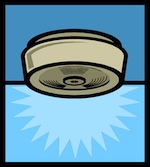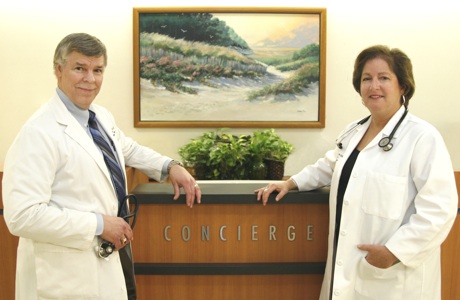

The Virginia Beach Premier Medical NewsletterMarch 1, 2011
Whooping Cough - In Adults!?

Pertussis (whooping cough) is a potentially serious respiratory infection that we usually associate with children, but it can definitely occur in teens and adults as well. In fact, there has been a resurgence of reported cases of this infection over the past decade – 17,000 in the U.S. during 2009. There are many additional cases that are undiagnosed or unreported. The illness is caused by a bacterium called Bordetella pertussis, which is highly contagious. It often results in severe coughing spasms, which in turn can cause a person to run out of air in the lungs and suddenly breath in causing the classic whooping sound, although this doesn’t occur in every case. The severe coughing can also cause vomiting and can even result in passing out. Early symptoms may include mild cough, low- grade fever and runny nose that may last for 2 weeks. The severe cough may last up to 10 weeks. Then the convalescent phase may go on for another 2 weeks. Pertussis is diagnosed by your doctor’s awareness of the signs and symptoms and can be confirmed if necessary by obtaining a sample of nasal secretions or by a blood test. The illness can be treated with appropriate antibiotics – usually those in the erythromycin family or by trimethoprim-sulfa. Even with the right antibiotic treatment however, the cough may still last for weeks. The best treatment is to prevent it, which is why we recommend that all of our adult patients get a pertussis vaccine (usually in combination with tetanus and diphtheria vaccine – called Tdap) every 10 years. Allergies
 Are you, or someone you know, suffering from recurring problems with sinusitis or bronchitis?
Are you, or someone you know, suffering from recurring problems with sinusitis or bronchitis?
If it seems like as soon as you get over one respiratory infection you are getting another, you may have an underlying allergic condition. You may be allergic to many things in your environment that you haven’t even thought about – like house dust, dried ornamental flowers, carpet fibers, etc. Ask your doctor about whether you might be a candidate for allergy testing. Cheap Ways to Become Healthy
Quit smoking – This is the best way to add at least 10 years to your life on average.
Regular physical activity – Walk, take the stairs, do jumping jacks during commercials, ride your bike. Avoid unnecessary medicine – If it’s not helping anything, don’t take it. Use generics when possible. Talk to your doctor first. Keep your weight down -Double the vegetables and halve the meat. Avoid the snacks after dinner. Practice preventive medicine – Vaccines, colon exams, Gyn and breast checks, bone density checks, annual physical. Drink water - instead of sugar-sweetened soft drinks. Only one alcoholic drink per day. Buy seasonal fruits and veggies when you can, canned or frozen when you can’t. Practice safety at all times. Use seat belts and helmets. Don’t speed. Carbon Monoxide Poisoning
 Carbon monoxide (CO) poisoning is a quiet killer. You can’t hear it or smell it. The only way you know it’s there is if you have a CO detector.
Carbon monoxide (CO) poisoning is a quiet killer. You can’t hear it or smell it. The only way you know it’s there is if you have a CO detector.
Cases of this frequently occur during winter months or when storms cause power outages. We get out the portable gas-powered generators, turn on the gas stoves and lanterns, and burn wood in stoves or fireplaces. Symptoms start with headache, dizziness, nausea, chest pain or confusion, but that’s if you’re awake. If you’re sleeping, you may not be aware of any of those symptoms. This is an entirely preventable problem. The CDC website (www.cdc.gov/co) has multiple prevention tips including always making sure you have a working CO detector, never using a gas stove to heat a home, never running a gas-powered device in an enclosed or even partially enclose space and never using a charcoal grill, lantern or camping stove inside a home, tent or camper. Did You Know...?
Thinning of the skin is a common side effect of topical steroids?
Prolonged use of systemic steroids like Prednisone can cause osteoporosis, fluid retention, weight gain, elevated blood pressure and blood sugar, purple bruises on the skin and increased susceptibility to infection? Acid reflux is a common cause of a chronic cough? A shingles vaccine should be given once to all patients aged 60 or over regardless of history of prior shingles or chicken pox? One-third to one-half of all physical symptoms are medically unexplainable? Vitamin D deficiency increases the risk of falling? All diabetics over age forty should be taking daily aspirin unless there is a contraindication? House Calls
 House calls have generally been considered obsolete over the past several decades. It’s very difficult for traditional primary care doctors to have the time to visit patients at home after a long day at the office, so many of them made it a general policy not to offer this service. There were always a few brave and dedicated souls who continued to make home visits for home-bound patients, but not very many.
House calls have generally been considered obsolete over the past several decades. It’s very difficult for traditional primary care doctors to have the time to visit patients at home after a long day at the office, so many of them made it a general policy not to offer this service. There were always a few brave and dedicated souls who continued to make home visits for home-bound patients, but not very many.
With the advent of concierge medicine, house calls are becoming a reality again. This is because the much smaller number of patients in a concierge practice allows the doctors more time to travel to and from patients’ homes. Our practice is happy to provide this service for those who can’t make it to the office. This adds a great sense of security for our patients knowing that they will not be left stranded without a doctor if they are homebound. It also allows many patients to remain in their homes much longer than they would be able to otherwise. Vaccines for Travelers
 If you will be traveling to a foreign country, make sure you have received all the vaccinations you need well in advance of your trip.
If you will be traveling to a foreign country, make sure you have received all the vaccinations you need well in advance of your trip.
Vaccines are the best way of preventing certain diseases that are endemic in other countries from affecting you – diseases like hepatitis, typhoid fever, yellow fever, diphtheria, anthrax and others. In addition to vaccines, you may also need certain other medications to prevent malaria or traveler’s diarrhea. You should also make sure you’ve had all the usual vaccines against flu, pneumococcal pneumonia, measles, mumps, chicken pox, tetanus and pertussis that you would normally receive regularly living in this country. It may take several weeks or months before the vaccines that you receive become effective in your system. You should, therefore, see your travel medicine specialist at least 8-12 weeks before your planned departure. We like to use Passport Health at 757-395-1345 for our travel medicine consultants. iPhone and iPad Apps
 For those of you who are tech-savvy and use iPads or smartphones for carrying around readily available information, here are some medical and health-related apps that are either free or relatively inexpensive that you may want to consider:
For those of you who are tech-savvy and use iPads or smartphones for carrying around readily available information, here are some medical and health-related apps that are either free or relatively inexpensive that you may want to consider:
ICE - personal health and emergency contacts About Our Office
Virginia Beach Premier Medical is a membership “concierge” internal medicine practice specializing in comprehensive and compassionate, individualized and personalized patient-centered care. We pride ourselves on full continuity of care – in the office, in the hospital, or even at home.
If you would like more information about our practice please call us at 757-416-6750 or visit our website at www.vbpm1.com. Ask to speak with Brittany, our office manager, or Dr. Parks or Dr. Warth. We’d be happy to talk with you anytime.
Discount Referral Program
Here’s an incentive!
If you are a member of our practice and if you refer someone to us who then signs up, we will give you $200 off your next year’s fee.
Here’s another plus! You can accumulate these referral discounts so that if you refer multiple people who then sign up, you will get $200 off the next year’s fee for each one. Happy St. Patrick's Day!
|


